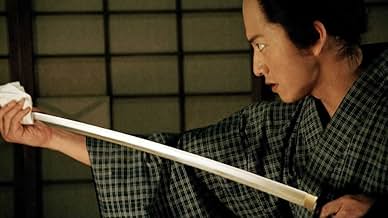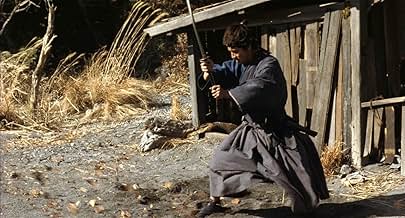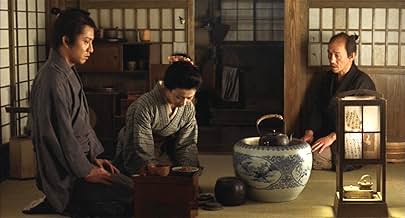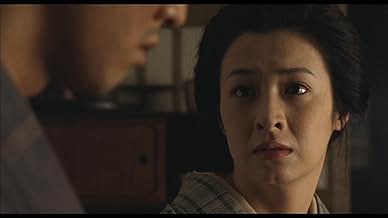VALUTAZIONE IMDb
7,7/10
4464
LA TUA VALUTAZIONE
Aggiungi una trama nella tua linguaA look at the relationship between a young blind samurai (Kimura) and his wife, who will make a sacrifice in order to defend her husband's honor.A look at the relationship between a young blind samurai (Kimura) and his wife, who will make a sacrifice in order to defend her husband's honor.A look at the relationship between a young blind samurai (Kimura) and his wife, who will make a sacrifice in order to defend her husband's honor.
- Regia
- Sceneggiatura
- Star
- Premi
- 15 vittorie e 16 candidature totali
Z. Charles Bolton
- Man B
- (English version)
- (voce)
Duncan Brannan
- Hori
- (English version)
- (voce)
- …
Cole Brown
- Sensei
- (English version)
- (voce)
Chris Burnett
- Shinsuke
- (English version)
- (voce)
Colleen Clinkenbeard
- Kayo Mimura
- (English version)
- (voce)
Recensioni in evidenza
Both the setting of the theme and the creation of the emotional atmosphere tend to make the film more romantic. And exquisite detail guarantees the reliability that a drama about ancient Japan should have. Although the film mainly focuses on the daily life of a samurai, the director Yôji Yamada still gave a little bit of chivalric romance to the ending. However, there is no coexistence between the everyday life and the spirit of a samurai.
Therefore, the protagonist's choice finally writes a summary for this passing era.
I love the Zatoichi films and have seen all but the very latest rebooting of the series ("Zatoichi the Last"--which is not available yet in the US). So it's obvious that I am a fan of the movies. However, I will also be the first to admit that they are completely ridiculous. After all, a completely blind swordsman who is able to take on dozens of opponents in each film and win is completely impossible...at least on this planet! Because of this, it's great to see "Love and Honor"--a Japanese film with a blind swordsman that is actually believable!!
The film begins with Shinnojo Mimura working for his lord as a food taster. One day, the unthinkable happens and Shinnojo is poisoned. While this ends up saving his master's life, it also ends up nearly killing Shinnojo and leaving him blind! And, as sometimes occurs in the tough feudal society, Shinnojo is left without a purpose and the prospect of losing his income. Some thanks for service to his master, huh?! However, uncharacteristic of many samurai films, soon Shinnojo learns that his master has not forgotten him and will keep giving him his original salary. So how does this end up resulting in Shinnojo fighting someone even though he's blind?! Well, I don't want to ruin the story--just watch this one.
The film has many, many strengths. It is a wonderful story, has a very thrilling conclusion and a touching love story--albeit an odd one! Well performed all around and one of the better samurai films I have seen--and I have seen quite a few. Well worth your time.
The film begins with Shinnojo Mimura working for his lord as a food taster. One day, the unthinkable happens and Shinnojo is poisoned. While this ends up saving his master's life, it also ends up nearly killing Shinnojo and leaving him blind! And, as sometimes occurs in the tough feudal society, Shinnojo is left without a purpose and the prospect of losing his income. Some thanks for service to his master, huh?! However, uncharacteristic of many samurai films, soon Shinnojo learns that his master has not forgotten him and will keep giving him his original salary. So how does this end up resulting in Shinnojo fighting someone even though he's blind?! Well, I don't want to ruin the story--just watch this one.
The film has many, many strengths. It is a wonderful story, has a very thrilling conclusion and a touching love story--albeit an odd one! Well performed all around and one of the better samurai films I have seen--and I have seen quite a few. Well worth your time.
Others have commented on the story so I will skip the synopsis.
The story is about human drama, and the unusual talent the main character has that leads to bombastic climax. This is typical Shuhei Fujisawa's style, and this story is no exception.
What took away from the story compared to other Shuhei Fujisawa based movie is the poor acting by Takuya Kimura. His impatient and jittery personality shows in his acting, and the poor ways he speaks the dialog all takes away from the proper mood of the story. As the member of SMAP - a Japanese idol group, his acting DNA was bread for more modern situation, and probably isn't a good match for a period drama like this one. I couldn't get the feeling that this was a samurai living several hundred years ago. His poor dialog skill also was evident in more recent movie Uchuu Senkan Yamato as well. Another period piece starring his SMAP colleague Shingo Katori's "Zatoichi The Final" was also a flop, attesting to the mismatch of SMAP member with samurai movies.
So the main focus was weak, but the movie still has quality all its own. The sword fight scene was superb like other Fujisawa novel based movies. As a samurai movie, this is still one of the best in recent years, and is recommended along with other Shuhei Fujisawa movies such as Hisshiken Torizashi, and Hana no Ato.
The story is about human drama, and the unusual talent the main character has that leads to bombastic climax. This is typical Shuhei Fujisawa's style, and this story is no exception.
What took away from the story compared to other Shuhei Fujisawa based movie is the poor acting by Takuya Kimura. His impatient and jittery personality shows in his acting, and the poor ways he speaks the dialog all takes away from the proper mood of the story. As the member of SMAP - a Japanese idol group, his acting DNA was bread for more modern situation, and probably isn't a good match for a period drama like this one. I couldn't get the feeling that this was a samurai living several hundred years ago. His poor dialog skill also was evident in more recent movie Uchuu Senkan Yamato as well. Another period piece starring his SMAP colleague Shingo Katori's "Zatoichi The Final" was also a flop, attesting to the mismatch of SMAP member with samurai movies.
So the main focus was weak, but the movie still has quality all its own. The sword fight scene was superb like other Fujisawa novel based movies. As a samurai movie, this is still one of the best in recent years, and is recommended along with other Shuhei Fujisawa movies such as Hisshiken Torizashi, and Hana no Ato.
So this is suppose to be Yôji Yamada's final movie in this style of samurai trilogy, the previous two films being "The Twilight Samurai" and "The Hidden Blade". And this final installment is absorbing as the previous films to some degree but also lacks the entertainment value like the previous films as well. Although this trilogy is sort of dry in some aspects. This however has slightly more of a modern feel to it compared to the previous 2 films in this trilogy. But it's still a bit slow paced and dry at times, this trilogy isn't for everyone but it does have it's target audiences. The protagonist is played by Kimura Takuya which I was hesitant with, but he played his role pretty well. The progression of the story could have been paced a little quicker, but I can understand why it takes the slower route. But still the slow pacing really makes this movie dry and sort of dull at times. This movie is also very far from being action packed despite it having samurais, but what it does have is drama and emotions. And wanting to know what happens next kept me attached to this story, despite the pacing being so slow at times. If the pacing was slightly quicker the movie would have been better in my opinion and would keep majority of the audiences attention, so the main flaw in my opinion is the pacing. Overall it's a pretty good final in this trilogy although the story has nothing to do with each other besides the fact that it all revolves around samurais, it's worth at least a watch.
7.6/10
7.6/10
A young samurai, married to a beautiful woman, accidentally becomes blind for life. This is the intimate story of what happens to this couple in mid-nineteenth-century Japan. Finding personal honor, love for oneself and for the woman one loves, finding a purpose for living. Director Yamada tells us this with an increasingly engaging and intimate narrative style. In my opinion very refined in the feelings it wants to convey, accurate in the scenic reconstructions of daily life of the time. Worth seeing if you liked, also by Yamada, Twilight of the Samurai (2002) even if it does not reach the depths of story, feelings and direction.
Lo sapevi?
- QuizIn the film it is mentioned repeatedly that the main character of Shinnojo Miura receives a yearly stipend of 30 koku. During the Edo period of Japan a koku was a unit of measure that had the equivalent of one year's worth of rice for a person (approx. 150 kg). For a samurai 30 koku was a small salary and Shinnojo was thus of a low level. Incidentally, the title character from another of Yôji Yamada's films Il crepuscolo del samurai (2002) also receives a 30 koku stipend after having 20 koku deducted from his 50 koku salary to pay for his recently deceased wife's funeral.
- BlooperIt is not stated why, when blinded, he could not continue with his food tasting role, for which sight is not required.
- Citazioni
Shinnojo Mimura: Be resolved you will both die. In that lies victory. Life lies in resolve for death.
- ConnessioniFollows Il crepuscolo del samurai (2002)
I più visti
Accedi per valutare e creare un elenco di titoli salvati per ottenere consigli personalizzati
- How long is Love and Honor?Powered by Alexa
Dettagli
- Data di uscita
- Paese di origine
- Sito ufficiale
- Lingua
- Celebre anche come
- Love and Honor
- Luoghi delle riprese
- Aziende produttrici
- Vedi altri crediti dell’azienda su IMDbPro
Botteghino
- Lordo Stati Uniti e Canada
- 60.910 USD
- Fine settimana di apertura Stati Uniti e Canada
- 5234 USD
- 4 mag 2008
- Lordo in tutto il mondo
- 33.755.574 USD
- Tempo di esecuzione2 ore 2 minuti
- Colore
- Mix di suoni
- Proporzioni
- 1.85 : 1
Contribuisci a questa pagina
Suggerisci una modifica o aggiungi i contenuti mancanti

Divario superiore
By what name was Bushi no ichibun (2006) officially released in India in English?
Rispondi

























